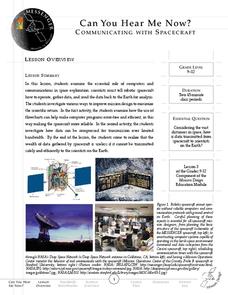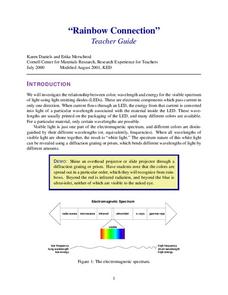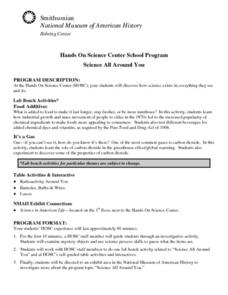Teachit
Life Cycle of a Penguin
Celebrate the circle of life with this fun hands-on activity. After cutting out, gluing together, and assembling this visual model, students are able to spin through and observe the life cycle of penguins.
Curated OER
Volcanoes: Second Grade Lesson Plans and Activities
Young geologists explore volcanoes with a series of engaging geology activities. First, they learn the difference between magma and lava before coloring and labeling the parts of a volcano. During the lab, individuals watch a...
It's About Time
Where are the Volcanoes?
Middle school geologists map the volcanoes closest to themselves, learn about map distortion, and infer possible future volcano locations. A focus on latitude, longitude, and volcanoes beneath the ocean helps connect the lesson.
Teach Engineering
Biomimicry and Sustainable Design - Nature is an Engineering Marvel
Discover how copying nature can be beneficial to humans. Scholars read articles about examples of biomimicry and its potential applications. Along the way, they learn about Nature's Nine Laws and how they relate to biomimicry. This is...
NOAA
Why is Hawaii's Ocean Important?
Studying the oceans? Focus on Hawaii's ocean with a resource packed with activity-based worksheets. Everything from products that come from the ocean to the abundance of plants and animals that call the ocean their home, Hawaii's ocean...
Center for Technology in Teaching and Learning
MedMyst: Disease Defenders
The news often refers to a team of experts handling situations and outbreaks of illnesses. Young scientists learn about such a team as they train to prevent infectious disease outbreaks Scholars meet three experts, learn about their...
American Museum of Natural History
Light Quest
Grab a partner and shed some light on light. A remote learning resource has scholars play a board game to answer trivia questions about light. They also read about how Einstein contributed to the understanding of light as both a wave and...
American Museum of Natural History
What Do You Know About Stars?
Illuminate the information about stars. Pupils respond to 10 multiple choice questions about stars. The questions cover topics such as the size of the Milky Way Galaxy, the Sun, and the life cycle of a star. The resource works as a...
Arbor Day Foundation
Trees: A Joy Forever
This Arbor Day, put on a show! A three-scene play follows a boy and girl that run into Arbor Day founder, J. Sterling Morton. Morton describes how the holiday came to be and discovers how his hard work has grown into a national...
DiscoverE
Foil Boats
How many pennies can an aluminum foil boat hold? That is the challenge in a collaborative activity designed to explore the concept of buoyancy. Learners use aluminum foil to build makeshift boats and test the weight they hold before...
NOAA
The Great, Glowing Orb What You Will Do: Make a Solar Heat Engine
How is solar energy able to move wind and water to control the climate? Scholars explore the concept of solar energy in the first of 10 activities in the Discover Your Changing World series. They follow instructions to build homemade...
Curated OER
Gumdrop Crystal Models
A great way to learn about molecular structures is to make a model. Gumdrops and toothpicks are used to construct crystal models. The models are based on theories of crystal shapes that occur because of positive and or negatively charged...
Curated OER
Five Senses Dice
Engage young learners in exploring the five senses with this fun dice template. Including pictures of a mouth, ear, nose, hand, and eye, this resource allows children to demonstrate their knowledge of body parts and what they are used for.
Grand Erie District School Board
Model Cell Project
If you're finishing up a unit on cells, here's a great project to get kids collaborating and recalling what they've learned in a fun and tangible way. Small groups create plant or animal cells out of materials they have at home. They use...
American Chemical Society
The Discovery of Fullerenes
Carbon is the most common element on earth, so the innovative discovery of a new type of carbon molecule won the 1996 Nobel Prize. In the ready-to-go lesson, scholars learn about C60 and how it has opened up the entire area of...
Messenger Education
Can You Hear Me Now?—Communicating with Spacecraft
Radio signals transmitted to Pluto take five hours to reach their destination! In these two activities, young scientists explore data communication in space. In activity one, pupils learn how data is gathered and sent back to Earth....
Messenger Education
Snow Goggles and Limiting Sunlight
Why would someone need contact lenses that offer UV protection? With a 28-page packet full of instruction and worksheets, learners discuss solar radiation and its potential harm to eyes. They make snow goggles similar to ones hunters...
Cornell University
LEDs Rainbow Connection
View LED lights through the eyes of a scientist. Young scholars learn to view light as a wave frequency and connect various frequencies to different colors on the light spectrum. A lab activity asks groups to measure the frequency of...
PBS
Four Corners
It's imperative to be as precise as possible. Future engineers learn about precision by building a cardboard machine. The base, corners, handles, and paddles must all be assembled with precision or the machine won't work.
Curated OER
Dilations in the Plane
Tenth graders investigate dilations and explore the dilation transformation before investigating the properties of a dilation using Cabri Jr. Students extend the concept of dilatation to the coordinate plane.
Curated OER
Angular Momentum (Automaticity)
Second graders experience practicing with a wide variety of vocabulary terms that relate to the Vista/Module "Angular Momentum:" momentum, inertia, force; motion, direction, centripetal force; angular momentum, gyroscope, resist. They...
Curated OER
Science All Around You
Students visit and explore a Hands On Science Center (HOSC). They participate in a variety of self-guided table exercises and observe as scientists demonstrate various scientific principles.
Curated OER
The Scientific Method
Students study the steps involved in the scientific method. They apply the scientific method to their science fair projects.
Curated OER
How Do Cells Reproduce?
Pupils examine cell division and the process of mitosis. In this cell reproduction lesson students grow yeast and observe the results, and learn about the career of scientific illustration.

























